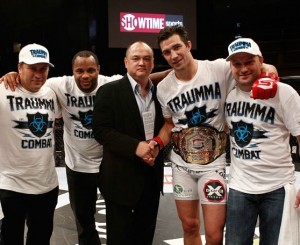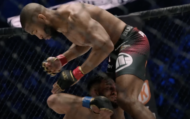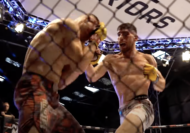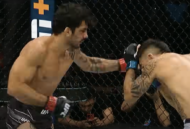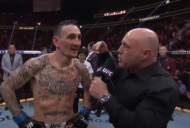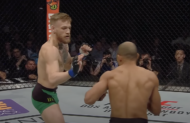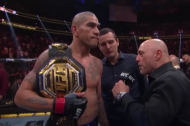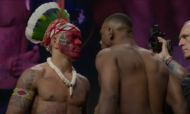Opinion: The UFC and Team-Based Rivalries
The other day I happened across an article by Fox Sports writer A.J. Perez, entitled “Team Concepts for a Solo Sport”. The article highlighted that the recent UFC on Fox: “Shogun” vs. Vera, featured a plethora of bouts pitting only a handful of preeminent fight camps against one another. The notable gyms on this card being American Kickboxing Academy (AKA), Alliance MMA, and Shogun’s Universidade da luta.
While Perez’s article primarily looks at the situation from a perspective of fight teams keeping track of other teams, with a less of a focus on organizational facilitation of such rivalries, it does open an interesting door and creates an excellent opportunity for some reflection on MMA’s rich history.
In MMA we’ve seen the team aspect of the sport implemented in a variety of ways. We have witnessed the short-lived and perhaps ill-conceived attempts of the IFL to directly adopt a team-based approach to MMA.
In the late great Pride FC, fans were treated to a smorgasbord of highly entertaining and even dramatic bouts, all of which was facilitated by the promotion capitalizing on the intense and often bitter rivalries between camps. Who can forget the Pride bouts that featured fighters from Brazilian Top Team and their nemesis, Chute Boxe?
Perhaps even more dramatic was the in-ring brawl between members of Team Hammer House and the members of Chute Boxe after “Shogun” was injured in his 2006 Pride 31 bout with Hammer House founder Mark Coleman.
If the possibility of an increasing reliance on camp-based competition becomes a reality within the UFC, and even other less popular promotions, there is great potential for some tremendous action stemming from rivalry. Rekindling the intense entertainment that resulted from camp feuds as seen in the bad blood between Ken Shamrock’s Lion’s Den and Tito Ortiz’s Team Punishment would undoubtedly lead to cards that fail to disappoint, along with bigger numbers in both pay-per-view buys and gate attendance figures. All of which is certainly good for the sport, and of course, the fans.
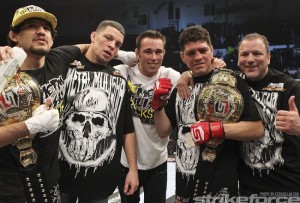
(From left to right): Gilbert Melendez, Nate Diaz, Jake Shields, Nick Diaz and their trainer Cesar Gracie have become a fearsome squad
Yet, I think there are some serious points that could hamper the rejuvenation of an MMA staple from a previous era in the sport’s history. The sport has become truly professional, the landscape has changed.
One could argue that a byproduct of the professionalization of MMA is that the allegiance of fighters to their respective camps might not be as ardent as it had been a decade ago. Fighters being professional athletes routinely shift from camp to camp, depending on which camp offers them the best training and management.
We only need to look at the rosters that made up BTT and Chute Boxe in the early 2000s. The standouts of these two stables, Wanderlei Silva, the Rua brothers, the Nogueira brothers, etc. are all no longer with the camps they fiercely represented.
To be sure, the decline in dedication to one’s camp is not due only to the shifting of independent interests of fighters, but also to the nature of the camps themselves. A professional MMA camp or team is a business, and if its services are deemed by fighters to be inadequate when compared to fees incurred, one cannot blame the fighter for finding a different place to train. After all, fighting in the top promotions is a job—a means of putting food on the table, it largely requires a businesslike approach to the sport. Blind loyalty to a camp at the possible expense of one’s own earnings and career progression is simply untenable in the sport today.
Additionally, we have seen that as the number of premier camps dwindles down to a select few, each housing a number of top fighters, friendship gets in the way of potential matchmaking. In the 2005 Pride Middleweight GP, both Wanderlei Silva and Mauricio “Shogun” Rua made their way to the semifinals, having stipulated beforehand that should they both be victorious that they would not fight each other.
In the UFC, When Keith Jardine was mentioned by Dana White as a potential opponent of fellow Jackson’s Martial Arts teammate Rashad Evans, the latter flat-out told his boss that he would not take the fight. A few years ago there was much hype over a potential light heavyweight pairing of Lyoto Machida and Anderson Silva, however, being both friends and Team Blackhouse members, no such fight ever took place.
While I would love to see the near blood feuds between fight camps reemerge in MMA, I think it’s highly unlikely. The sport has evolved along with its fighters.
The team rivalry, while a highly entertaining angle, no longer offers the entertainment value that it once had primarily because of the continually changing identity of camp rosters, as well as the costly byproduct of camp specialization which has squashed many potentially lucrative and interesting fights.
Team rivalry does still exist, but the era of fight cards being dominated by camp rivalry so intense that it alone can increase a promotion’s bottom line has long since passed, replaced by the era of the truly professional fighter.


